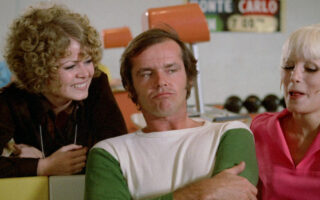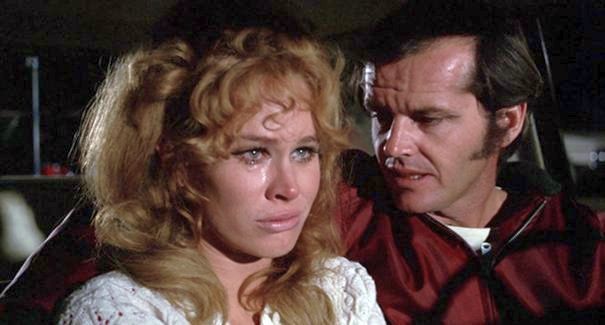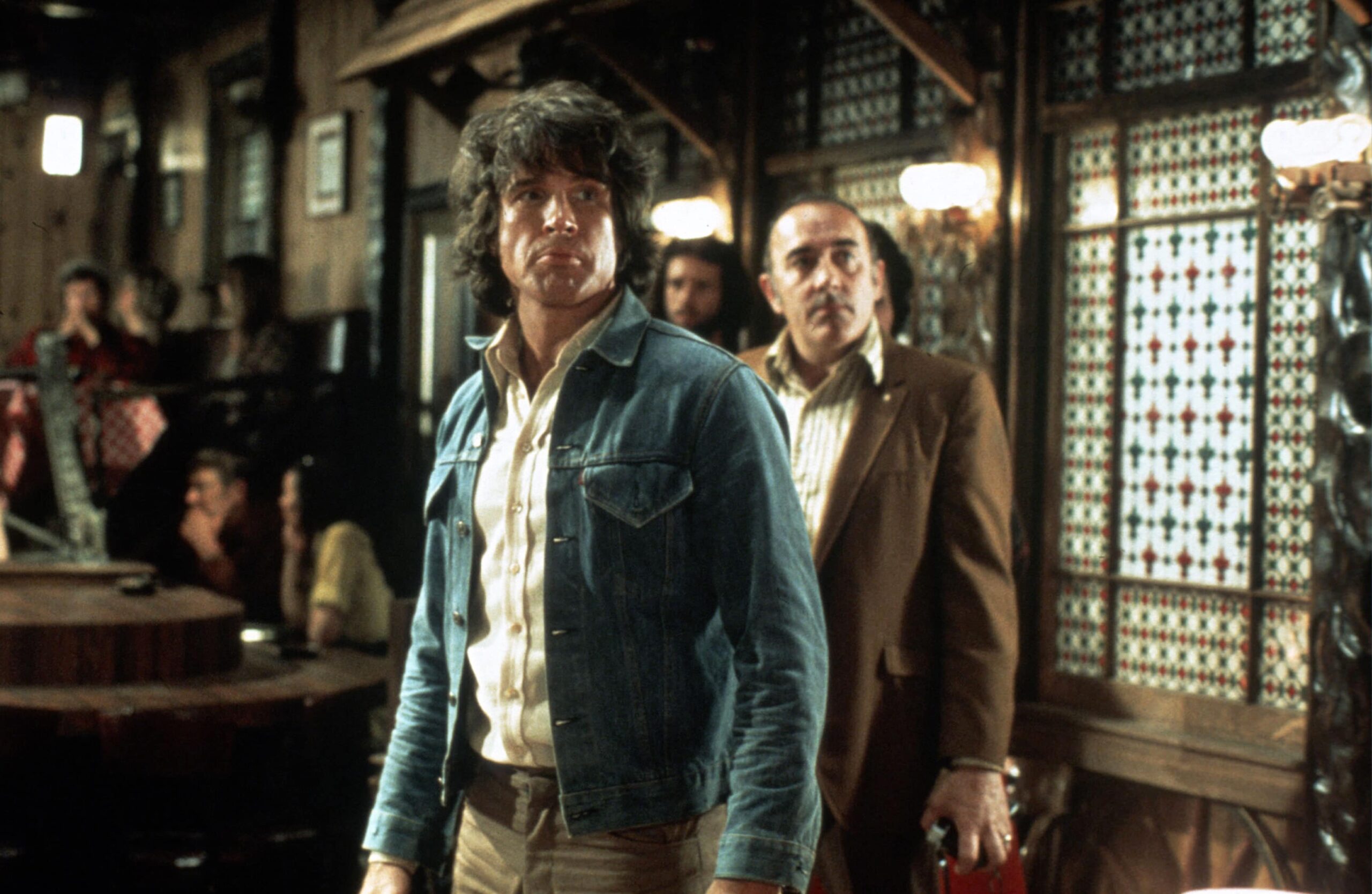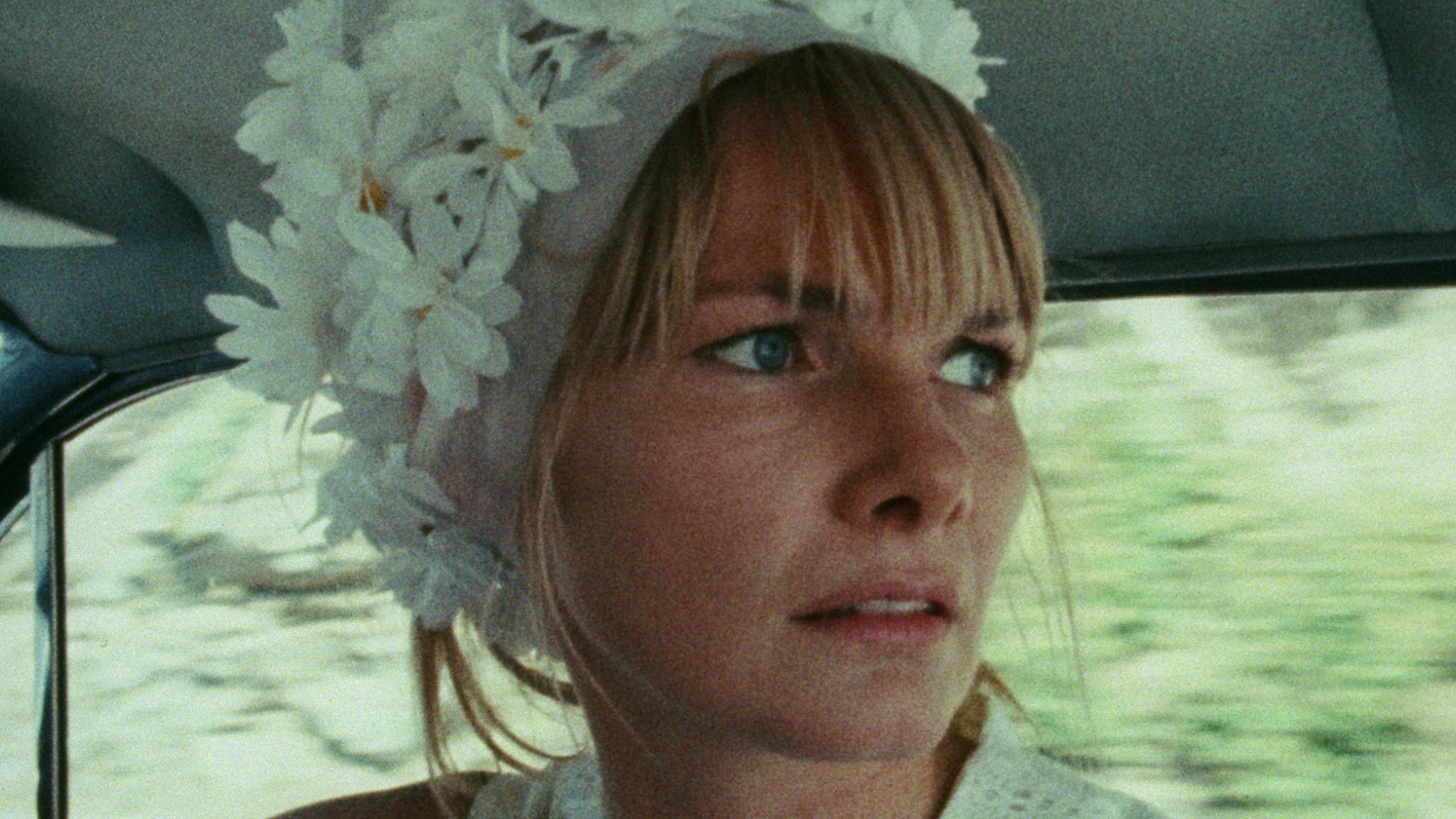The following feature on Five Easy Pieces is part of “Esmarelda’s Summer Seventies Series.”
Five Easy Pieces is about a man who can’t break up with his girlfriend. The movie begins as Bobby DuPea (Nicholson) comes home from a hard day of work on the oil rig. He grabs a beer and moves through his small house as his big-eyed waitress girlfriend, Rayette – Karen Black in an Oscar-nominated role – blasts Tammy Wynette’s “Stand by Your Man” on the record player. Rayette has dreams of being a singer and leans on her lover for his musical background, but she chronically, obsessively, beggingly asks Bobby to tell her he loves her, and after dodging the question one too many times he finally answers her with the all-too telling, “what do you think?”
Throughout the second act of the film, Bobby becomes increasingly restless with the life he’s built working on the oil rig. He doesn’t want to marry Rayette, but for some strange reason – most suspiciously the looming fear of loneliness – he can’t bring himself to break up with her either. After his best friend is arrested on suspicion of robbery, Bobby seeks out his sister Tita – played with great performance by the noticeably frazzled Lois Smith – who informs Bobby that his father has suffered two strokes and he might not have much longer to live.
 Bobby quits his job at the oil rig and sets out to visit his family with, for reasons none other than guilt, Rayette in tow. Upon arriving at his father’s house, Bobby puts Rayette up in a motel, not wanting to bring her with him. He is gruff, and curt, and informs her, “if you have to go, you can go.”
Bobby quits his job at the oil rig and sets out to visit his family with, for reasons none other than guilt, Rayette in tow. Upon arriving at his father’s house, Bobby puts Rayette up in a motel, not wanting to bring her with him. He is gruff, and curt, and informs her, “if you have to go, you can go.”
While at his father’s house, Bobby reconnects with his brother Carl who notes that Bobby has not been home in three years. They hob knob and socialize with the town’s elitist intellectuals, and Bobby develops a crush on Carl’s young musician girlfriend, Catherine. Tita wants Bobby to make peace with his father but Bobby’s feelings for Catherine boil over into a short-lived tryst one day before the lonely, abandoned Rayette comes knocking on the door, oblivious to Bobby’s desire to give her the boot.
Bobby makes peace with his invalid father and packs up to leave, taking Rayette with him. They hop in the car and hit the road, with Rayette showering him with unwanted affection along the way. The two stop at a gas station on the ride home and while Rayette is inside the snack shop purchasing a drink, Bobby hitches a ride with a lumber driver and once again abandons Rayette, headed back in the direction of his father’s house and, presumably, Catherine.
Jack Nicholson gives the subtle and slick type of performance that he is known for, with bursts of emotion boiling over his otherwise pensive and uneasy slouch. It almost feels that his desire to withdraw into the background lends itself to more attention heaped onto him from both his family and Rayette. You often get the feeling that Bobby wishes nothing more than to disappear, but such a disappearance would not bring him the happiness that he desires. He’s on the fence, always, torn between two realities and finding none that suit him or bring him peace. He is the youngest son from a pack of upper-crust musical geniuses who retreated from his family’s high society life in order to slum it with the ordinary folk who make the world turn. But he’s bored with the ordinary, particularly Rayette who gives about 35% of her effort in everything she does besides sticking to Bobby’s side. She’s a limp-wristed bowler who pouts and begs, and since Bobby seems to dip his love stick into as many other willing participants around town as he can. I found myself wondering, why does he not simply send Rayette packing? It’s almost as though the expectations of him at the home he abandoned are just as prevalent as the expectations of him in the “ordinary” world. He either goes home where he is expected to be a piano prodigy, or he stays in Wasco, CA where he is expected to marry Rayette, work the oil rig and drink beer every night. Bobby wants nothing more than to live in a world without expectations, yet everywhere he turns there is someone waiting to impart their ideas of his future on him. It seems that Bobby’s truest desire is simply to just exist unbothered.
The other standout here is Karen Black’s Rayette, a simple-minded lady with a delusional dream and the inability to take a hint. Her desires are the complete opposite of Bobby’s desires. She wants the ordinary, she likes normalcy. She’s a creature of complacency who wants nothing more than to fiddle with her makeup and hair while she watches TV. In contrast to Bobby’s desire… Rayette does exist unbothered. She’s without thought, effort, or motivation. She crumbles and sobs and sulks. She can’t take a hint – or she refuses to admit that the hint even exists in the first place. It often seems that she has taken the battle cry of Tammy Wynette to a level of utmost extreme. It can almost be argued that the reason Bobby doesn’t cut the cord with Rayette is because he still holds out hope, or thinks she has potential. She’s beautiful, she’s loyal, but she’s missing that extra dose of intellectual intrigue to keep his focus squarely on her.
While on the surface, “Five Easy Pieces” appears as a poignant and meaningful analysis of a prodigal son returning to the life that he abandoned, on a subtextual level, the film evokes an equally loud commentary on the prodigal son’s girlfriend – a woman who spends so much time filling her head with commercialized ideas of love that she neglects to develop any skill or personality needed to sustain the interest of the man whose love she so desperately craves in the first place.
















